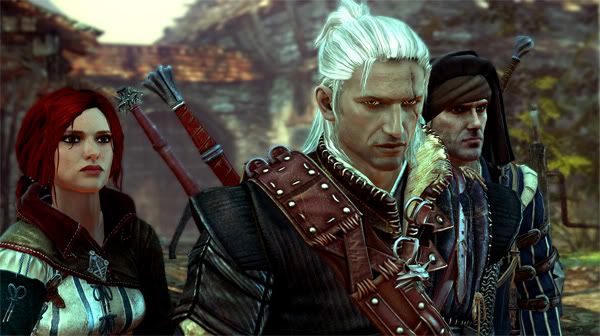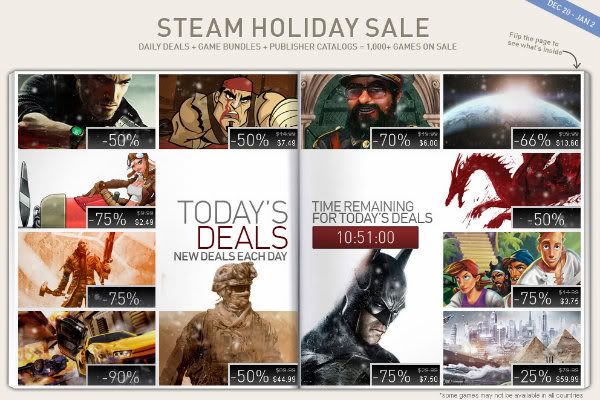This post has not been edited by the GamesBeat staff. Opinions by GamesBeat community writers do not necessarily reflect those of the staff.

File this one under perplexing as much as anything else…I certainly was confused when I read some of what Good Old Games Managing Director Guillaume Rambourg and marketing head Trevor Longino said about Steam sales. The pair of them recently had an interview with PC games blog Rock, Paper, Shotgun, and among the subjects, they discussed price and value.
When asked about things like discounts (perhaps the most famous examples being Steam sales, which can include entire catalogs of games for pennies on the dollar), they took a stance that I didn't expect:
Selling games at too high a discount — one often sees discounts above 80 percent off here and there — sends a message to gamers: this game, simply put, isn’t worth very much.
They further argue that while sales motivate a lot of people to buy, having massive price cuts is "damaging the long-term value of your brand because people will just wait for the next insane sale."
Now, what I find strange about this is that GOG has been no stranger to sales itself. Hell, recently it was just giving the original Fallout away for free to whoever wanted it. Certainly GOG is aiming at a slightly different market given that a lot of their titles do fall under the realm of classics, but considering that they have titles like Assassin's Creed, Hitman: Blood Money, and the Witcher series, they might be trying to branch out more.
When asked about sales, they responded, "Our average sale tends to be around 40 percent to 50 percent off; that’s plenty of incentive to pick up a game if you’re interested or if you just think you might like to try it because you’re not sure about the game, but not some crazy 75 percent or 85 percent discount that damages the long-term value of a game."
The thing is though, looking through GOG's library, you'd be pretty hard pressed to find something that costs more than a twenty (at the moment only Witcher 2: Assassins of Kings does so at a $39.99 price point), and with a lot of games costing 10 dollars or less, there's not really any need for a deep sale. This is perhaps the point that GOG is trying to raise, but the issue here is the same one I touched upon earlier: Most of these games aren't new, so no one could really justify trying to sell them for a new-game price point anyways. If one takes the rant to simply be an angry diatribe directed at a rival delivery service, then yeah, it kind of falls flat. I think that there's much more than that here, though.

It's strange because it feels like GOG's stance should be something that I'd argue against, and yet the points they're making are ones that I feel are in line with the way I've looked at things. Take this quote, for example:
Our industry failed to provide gamers with a fair and attractive offer on day one and, therefore, convince them to buy games when they are released, which is the best way to support a publisher or developer from a financial standpoint.
What I believe (or at least would dearly like to believe) they are saying here is that if the industry wants the support of the people it needs to survive, then it should be making games worth it from day one. I can't argue with that point because that's the kind of thing I want happening. Whether the value means a lower price point or more content that actually makes the game worth the expensive purchase price out the gate or a combination of the two, it doesn't matter. This is something that should be happening.
But I don't agree with every point they make in the interview, particularly that "[h]eavy discounts are bad for gamers, too. If a gamer buys a game he or she doesn’t want just because it’s on sale, they’re being trained to make bad purchases, and they’re also learning that games aren’t valuable." I would counter that with the observation that people with poor impulse control are people with poor impulse control regardless of whether or not a sale is going on.
If the only selling point of a game is that it's actually on sale, then you need to take a step back and consider whether or not you're buying this because it's something that you're genuinely interested in or only because it's heavily discounted. I've certainly seen a fair share of games that I could have bought for huge discounts, but given that I didn't care about the titles in the first place, I don't see what would compel me to buy them now just because it's cheaper to do so. Perhaps I'm an odd case in respect to sales, but certainly, a line has to be drawn somewhere. They admit as much, though, when they continue:
There’s a counter argument to that, of course, which is that sales encourage people to try games that they’re not sure about. And there’s a certain truth to it, but I think that you need to reach a happy medium between giving someone a chance to take a risk without feeling like they’ve gotten a bad deal, and pricing things so cheaply that you tell gamers, "This game I made isn’t worth very much."

It makes sense that someone would buy a game that they are up in the air about, but gaming isn't the first or last sort of hobby to suffer from impulse buys. I would take the stance of cavet emptor towards such things, but that's something that's neither here nor there. A prevalent mindset right now is that if a person wants a game, all he has to do is wait in order to get it at a better price.
Sometimes that wait is less than two weeks. Sometimes it does mean having to sit by for months until some service is selling it, but either way,it portrays the opposite to what GOG is saying here: That rather than games not being worth very much, gamers know something that's overpriced when they see it and will gladly wait for a better opportunity to present itself.
I'll admit, I wanted to be mad about all of this. I certainly thought I was going to be. After looking at what they're saying, though, I can't help but think that they're raising good points — misplacing the blame, perhaps, but raising good points nonetheless.
I wouldn't say that the Steam sale is the root of all evil here, but rather, the fact that games are priced so high in the first place is why sales have to happen in order for some people to buy. People want value, and if given value, they will be happy. There's nothing difficult about that, so why does it take people obviously pointing it out like this to make us think about it?
I don't have an answer for that; if I did, I'd be rich enough to afford all the games on Steam, regardless of whether they're on sale or not.
